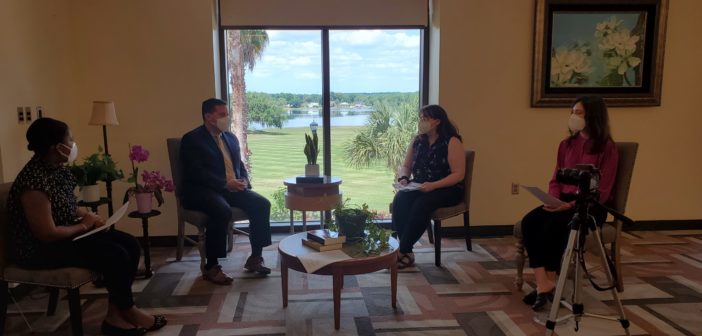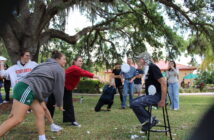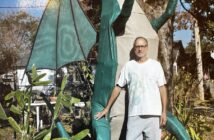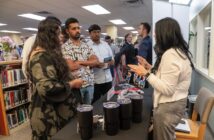By Alora Peters, Arts & Culture Editor
The 2020-2021 academic year was a difficult year for students and faculty alike at Saint Leo University. Despite the challenges, however, the university remains optimistic for the future.
The Lions’ Pride Media Group recently conducted an interview with Saint Leo University’s President Jeffrey Senese. The conversation provided a number of interesting and important takeaways, including projected plans for University Campus, reflections on what went well and what went poorly during the past “COVID” year, and how the University wants to communicate with and hear from students.
No one can contest that the COVID-19 pandemic and the accompanying measures designed to prevent the spread of the disease weighed heavily on Saint Leo and its students this year. Senese wholeheartedly agreed.
“I think it’s a tough year for both faculty and students,” he said.
One of the starkest differences between the Saint Leo experience of the 2020-2021 school year and previous years lay in the methodology of education. Classes were held largely on the video conferencing platform Zoom, with students attending fully online via the Connected Classroom format, or via a combination of in-person and online streaming by using the Hybrid format.
In an anonymous survey conducted by The Lions’ Pride, 78% of student respondents expressed that they felt the quality of education had diminished under the transition to remote instruction under COVID-19.
Senese suggested that the best way for students to combat learning deficiencies would be to directly contact and approach their professors. He stressed that the ability to develop one-on-one relationships with faculty members is one of the most crucial and unique elements of a Saint Leo education.
“I would say to students, they should approach their faculty to provide additional assistance and support,” Senese said. “Go to the faculty. The faculty are here for the students. I think they would welcome those comments.”
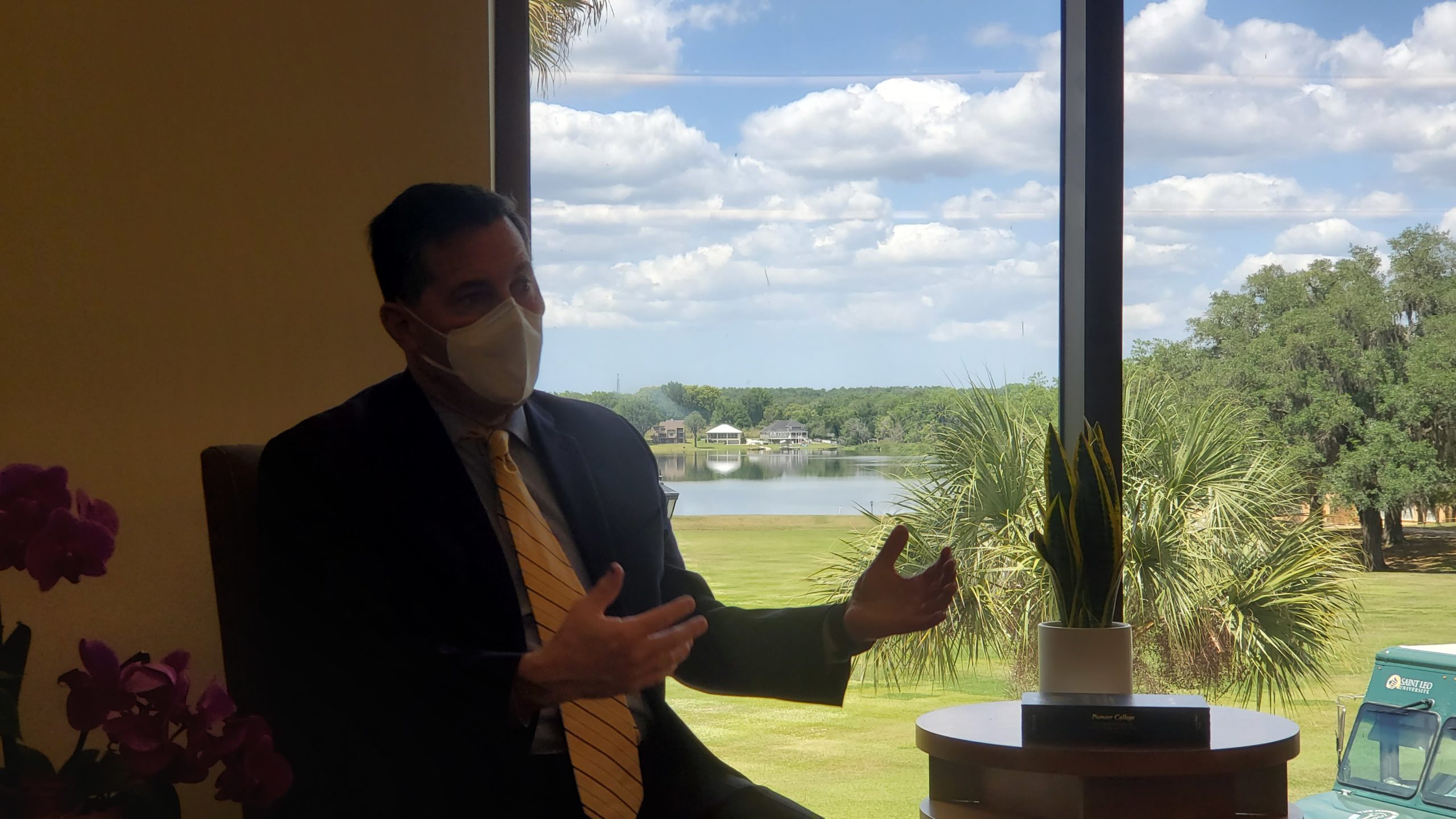
Students also raised concerns about the hours available for eating in the dining hall and other locations on campus. Benedict’s Coffeehouse, for example, had previously remained open for service until 12:00A.M.; over the past year, the coffeeshop typically closed at 7:00P.M. instead.
The hours were limited, Senese explained, due to the COVID-19 restrictions that forced the university to hire less staff to work during those hours.
“The dining hall team didn’t like the environment they were operating in,” said Senese. “But it is the environment that we had to operate in.”
The Hungry Lion Food Truck, which opened on campus back in February, also brought disappointment to some students, due to the truck’s limited hours. The Hungry Lion was only open on Tuesdays, Wednesdays, and Thursdays, for a few hours around lunchtime.
“The Food Truck isn’t fully opened yet,” said Senese, explaining during the interview that the current, limited hours of the truck largely have resulted from having a limited staff to manage the entity.
“The hours we did were because of the staffing we had,” he said. “It’s difficult to hire people right now.”
As a trial run, the university had opened the Food Truck during the midday hours primarily to appeal to faculty and staff working on campus.
Previously, faculty had been allowed to buy special meal plans in the dining hall; due to limited capacity restrictions, faculty had been prohibited from purchasing and using these dining plans and had been forced to find other options. The Food Truck had provided another mealtime possibility.
This year, students also found issues with the quality of food being offered. 80% of survey respondents to The Lions’ Pride thought the quality of the food in the cafeteria had decreased, compared to the 20% who argued it had increased.
Senese urged students to let the university know what they liked and did not like about the meal options, to help the university better appeal to the tastes of the student body.
“Students should come forward and say, ‘This is the kind of food we want,’” said Senese.
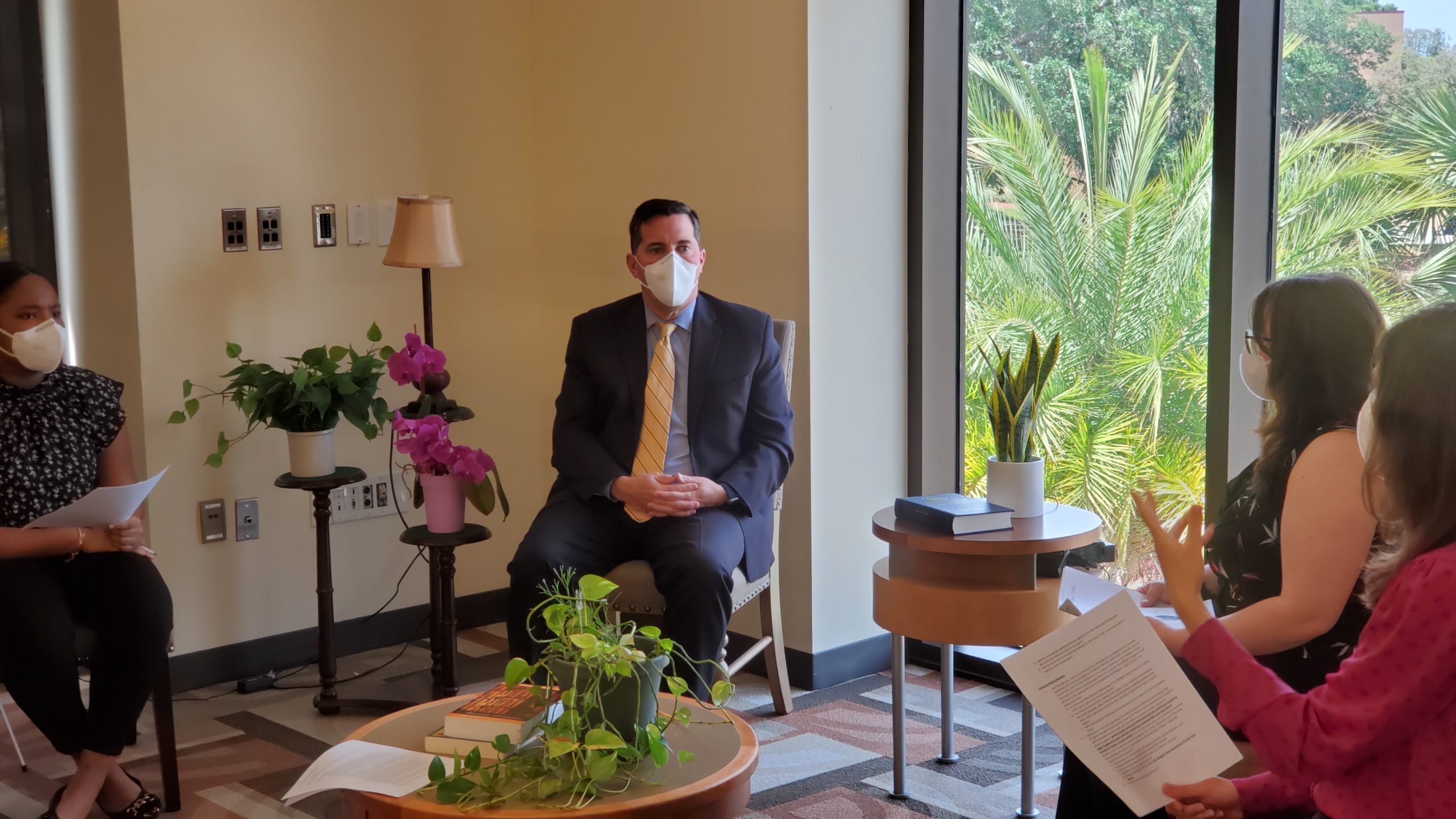
Another controversial issue discussed during the interview was the quality of care that students were receiving during their quarantine periods after they had been diagnosed with COVID-19. Common complaints from students included improper meals or a lack of basic necessities, such as toilet paper.
“As we heard students’ complaints, we made adjustments,” said Senese. “We’d never done this, students had never done this—so we learned.”
This year, Saint Leo had hired a doctor and five other staff members to help manage the quarantine situation on campus. However, during both the Fall and Spring semesters, COVID-19 cases peaked on campus, meaning that there were points when hundreds of meals were being delivered to quarantining students each day and staff were stretched thin.
“It’s not an ideal situation to be quarantined,” Senese said. “Nobody likes it. I can get why people would complain about it—I would complain if I had to do that! But the vast majority of people who quarantined understood that… the university did the best it could in this situation.”
While COVID-19 restrictions caused a number of unfortunate and unavoidable problems, there were some positive results from the university’s procedures.
“Look at the infection rate at Saint Leo compared to other universities,” said Senese, pointing out the proportion of students at Saint Leo who caught the virus was significantly lower compared to other local universities, such as the University of Tampa.
Senese also stressed that Saint Leo was able to offer the majority of its classes via the Hybrid modality, which still allowed students to attend class in-person. Many other universities did not offer a comparable option, operating entirely online.
Saint Leo also experimented with a number of iterations of virtual campus events and continued to offer Mass in the Abbey Church on campus throughout the school year.
As to what University Campus will look like in the upcoming Fall 2021 semester, Senese hopes that campus life will be “as normal as we can make it.”
“Our intention is to open fully,” said Senese. Provided that the number of coronavirus cases continues to decrease, and no additional restrictions are placed upon gatherings, Senese confirmed that the University plans to return to normal functions, including face-to-face classes.
The University has already announced that intends to “discontinue Hybrid and Connected Classroom learning options” for both University Campus and its education centers by the fall, via an email that was released on April 19.
Dining hours for the cafeteria, Fusion Eatery, and Benedict’s Coffeehouse are also expected to be restored to their normal operating times.
“As normal hours as we can get is what we are shooting for,” said Senese.
Aside from the return to a sense of normalcy, the university has other exciting, upcoming plans. One important new addition to the University Campus is the opening of the new Wellness Center.
“It’s going to create a totally different environment and community on campus,” said Senese. “Our goal every year is to add something that can enhance the environment.”
The university also plans to expand its dining options, including access to The Hungry Lion.
“The purpose of the Food Truck wasn’t intended to be a replacement for meals,” said Senese. “It was for after hours. A lot of students will go into the city, and we wanted to provide an option for them here [on campus].”
Additionally, expansions to the dining hall are in the works, and are likely to begin construction sometime over the summer. The university plans to extend the hall using the empty land that runs in between the Student Community Center and St. Francis Hall.
“We know now that we need a bit more space in the dining hall,” said Senese. “The expansion will probably take twelve months. It could go faster or slower, but it’s a little bit simpler of a building [project]in that it is an extension.”
While the ground floor of the expansion will, naturally, be dedicated to the cafeteria, the university is still discussing what the upper level will be used for.
“We’re talking about a couple of different ideas. One of the ideas is a pub,” said Senese. “So, for students, for faculty and staff who are 21 and older, there would be something that looks like a little English pub. A sports bar is another idea that we had.”
Part of the university’s aim is to create a dining option for visitors who come to campus.
“There really is no place for parents who come here, or people who come to see sporting events, with the Abbey Tavern closed,” said Senese.
Another important addition to the university campus that is currently being considered is a grotto.
“We’d like to add another worship space on campus—a grotto—on our side of the campus,” said Senese. “The Abbey has two grottos [across the street], but I don’t want students and faculty walking across 52!”
The idea would be to construct the grotto around the fallen tree, located on the hill between the Abbey Church and the Marmion and Snyder dormitories. The grotto would hopefully be completed by the end of spring next year.
While many students are excited about the installation of new buildings and the upgrades of existing ones, issues do remain with some of the older buildings on campus. Lewis Hall, for example, and Apartment Buildings 1-4 are largely regarded by students and faculty to have mold problems.
There is no easy answer to this pressing concern, however, due to the costs associated with a complete renovation.
“Take Lewis Hall, for example,” said Senese. “To replace that building, it would be between 37 and 47 million dollars… it’s not money that we have right now. The updates with Fuz, with the Food Truck, they’re really miniscule compared to what we’re spending on capital improvements every year.”
Senese and other university staff will be conducting an annual tour and inspection of all of the university campus building over the summer, to see which areas are most in need of improvement. On the previous campus tour, Marmion, Snyder, and Henderson were pinpointed as the buildings with the most pressing concerns.
Senese, again, encouraged students to come forward with their complaints.
“If there is an area that needs attention, tell us,” he said. “If there are things that need to be addressed, we want to know now. We’ll do our best to address it.”
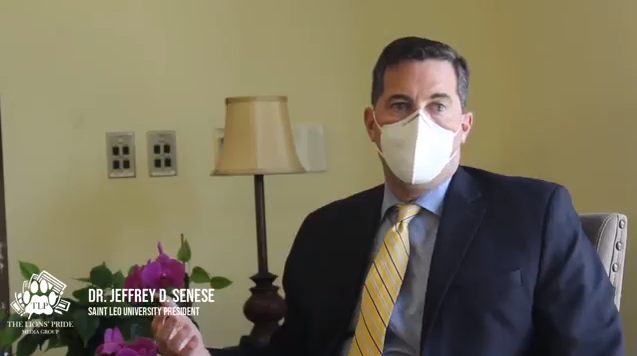
Finally, Senese discussed with The Lions’ Pride the possibility of creating a new forum that would allow students to submit questions and complaints like these to the university and give students the opportunity to voice their opinions, concerns, and hopes.
“I’m totally open to that—let’s figure out how to do it,” said Senese. “We could do—every semester—an open forum, over in Selby Auditorium.”
A town hall style question-and-answer forum would also provide a chance for faculty and staff to communicate their plans and ideas to students, as well as a chance to listen to the thoughts of the student body.
“We’re here because of the students. We’re not here to serve ourselves,” said Senese. “We need the dialogue, we need to establish that.”
The Lions’ Pride will be working over the summer to establish set dates where students, faculty, and staff can come together and looks forward to facilitating further dialogue.

